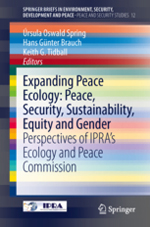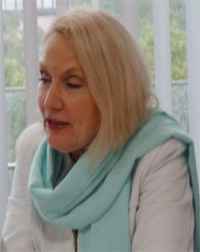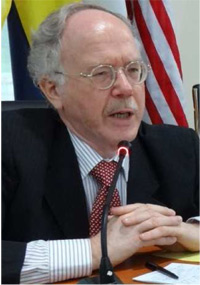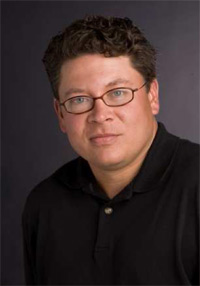|
|
| |
|
| |


SpringerBriefs in
Environment, Security, Development and Peace (ESDP)
A Peer-reviewed Book Series
Edited by
Hans Günter Brauch
Free University of Berlin and AFES-PRESS
| Vol 12 |
Ursula Oswald Spring; Hans Günter Brauch; Keith G. Tidball (Eds.): Expanding Peace Ecology: Security, Sustainability, Equity and Peace: Perspectives of IPRA’s Ecology and Peace Commission 1. SpringerBriefs in Environment, Security, Development and Peace, vol. 12. Peace and Security Studies No. 2 (Cham – Heidelberg – New York – Dordrecht – London: Springer-Verlag, 2014).
ISBN (Print): 978-3-319-00728-1
ISBN (Online/eBook): 978-3-319-00729-8
DOI: 10.1007/978-3-319-00729-8
More on this book
Order Form
Order this book on the Springer Website
Order electronic version and individual chapters |

|
| |
|
|
-
Addresses linkages between sustainability, transition and sustainable peace
-
Focuses on peace, environmental education, community-based ecological restoration and ability expectation
-
Underlines the need to combat trafficking of women and children by transnational crime rings in Nigeria, a national security threat
This book has peer-reviewed chapters by scholars from Australia, Canada, Germany, Japan, Mexico, and the USA that were presented to the Ecology and Peace Commission (EPC) of the International Peace Research Association (IPRA) in November 2012 in Japan. The chapters address these themes: Expanding Peace Ecology – Peace, Security,Sustainability, Equity, and Gender; Two Discourses on Global Climate Change Impacts:From Climate Change and Security to Sustainability Transition; Peace Research and Greening in the Red Zone: Community-based Ecological Restoration to Enhance Resilience and Transitions Toward Peace; Social and Environmental Vulnerability in a River Basin of Mexico; Mobile Learning, Rebuilding Community Through Building Communities, Supporting Community Capacities: Post Natural Disaster Experience; Transforming Consciousness through Peace Environmental Education; Building Peace by Rebuilding Community; Ability Expectations and Peace and on Satoyama Sustainability and Peace.
Content Level » Research
Keywords » Community Capacities - Ecological Restoration - International Trafficking - Peace Building and Education - Peace Research - Security - Sustainability Transition - Sustainable Peace
Related subjects » Social Sciences - Sustainable Development
On the Editors
 |
Ursula Oswald Spring (Mexico), full time Professor/Researcher at the National University of Mexico (UNAM) in the Regional Multidisciplinary Research Center (CRIM), she was national coordinator of water research for the National Council of Science and Technology (RETAC-CONACYT), first Chair on Social Vul¬ne¬rability at the United National University Institute for Environ¬ment and Human Security (UNU-EHS); founding Secre-tary-General of El Colegio de Tlaxcala; General Attorney of Ecology in the State of Morelos (1992-1994), National Delegate of the Federal General Attorney of Environment (1994-1995); Minister of Ecological Development in the State of Morelos (1994-1998). She was President of the International Peace Research Association (IPRA, 1998-2000), and General Secretary of the Latin-American Council for Peace Research (2002-2006). She studied medicine, clinical psychology, anthropology, ecology, classical and modern languages. She obtained her Ph.D. from University of Zürich (1978). For her scientific work she received the Price Sor Juana Inés de la Cruz (2005), the Environmental Merit in Tlaxcala, Mexico (2005, 2006), UN Development Prize. She was recognized as Women Academic in UNAM (1990 and 2000); and Women of the Year (2000). She works on non-violence and sustainable agriculture with groups of peasants and women and is President of the Advisory Council of the Peasant University. She has written 46 books and more than 328 scientific articles and book chapters on sustainability, water, gender, development, poverty, drug consumption, brain damage due to under-nourishment, peasantry, social vulnerability, genetic modified organisms, bioethics, and human, gender, and environmental security, peace and conflict resolution, democracy, and conflict negotiation. |
| |
|
|
Hans Günter Brauch (Germany), Dr., Adj. Prof. (Privatdozent) at the Faculty of Political and Social Sciences, Free University of Berlin; since 1987 chairman of Peace Re¬search and European Security Studies (AFES-PRESS). He is editor of the Hexagon Book Series on Human and Environmental Security and Peace (HESP), and of SpringerBriefs in Environment, Security, Development and Peace (ESDP) and of the SpringerBriefs of Pioneeres in Science and practice with Springer-Verlag, He was guest professor of international relations at the universities of Frankfurt on Main, Leipzig, Greifswald, and Erfurt; research associate at Heidelberg and Stuttgart universities, and a research fellow at Harvard and Stanford Universities.
In fall and winter 2013/2014 he was a guest professor at Chulanlongkorn University in Bangkok (Thailand) and Adj. Prof. at the National University of Malaysia (UKM), He published on security, armament, climate, energy, and migration, and on Mediterranean issues in English and German, was translated into Spanish, Greek, French, Danish, Finnish, Russian, Japanese, Portuguese, Serbo-Croatian, and Turkish. Recent books in English: (co-ed. with Liotta, Marquina, Rogers, Selim): Security and Environment in the Mediterranean. Conceptualising Security and Environmental Conflicts, 2003; (co-ed. with Oswald Spring, Mesjasz, Grin, Dunay, Chadha Behera, Chourou, Kameri-Mbote, Liotta): Globalization and Environmental Challenges: Reconceptualizing Security in the 21st Century, 2008; (co-ed. with Oswald Spring, Grin, Mesjasz, Kameri-Mbote, Chadha Behera, Chourou, Krummenacher): Facing Global Environmental Change: Environmental, Human, Energy, Food, Health and Water Security Concepts (2009); (co-ed. with Oswald Spring): Reconceptualizar la Seguridad en el Siglo XXI (2009); (co-ed. with Oswald Spring, Mesjasz, Grin, Kameri-Mbote, Chourou, Dunay, Birkmann), Coping with Global Environmental Change, Disasters and Security – Threats, Challenges, Vulnerabilities and Risks (2011); (co-ed with Scheffran, Brzoska, Link, Schilling).
|

|
| |
|
|
 |
Keith G. Tidball (USA) is a Senior Extension Associate in the Department of Natural Resources where he serves as Associate Director of the Civic Ecology Lab and Program Leader for the Nature & Human Security Program. He is also the New York State Coordinator for NY Extension Disaster Education Network. Tidball's research is focused on the dynamics of natural resource management in the context of disasters and war. His recent edited volume published by Springer titled Greening in the Red Zone: Disaster, Community Greening, and Resilience deals specifically with the importance of humans’ relationships with the rest of nature in times of conflict and crisis. |
| |
|
|

|
|
|